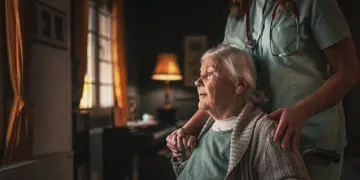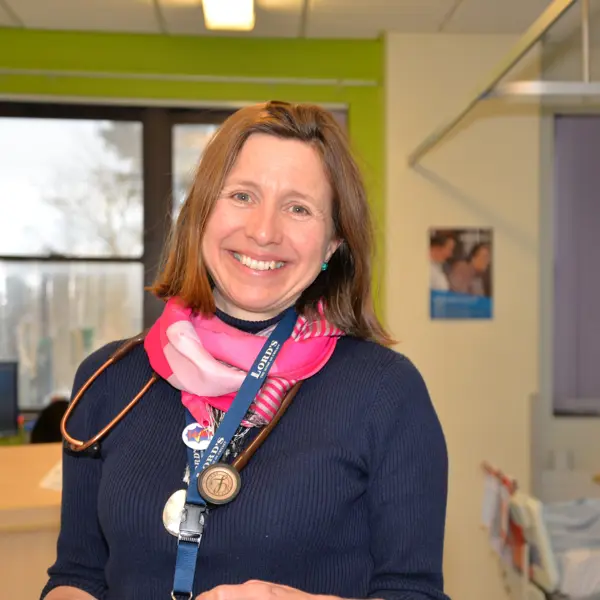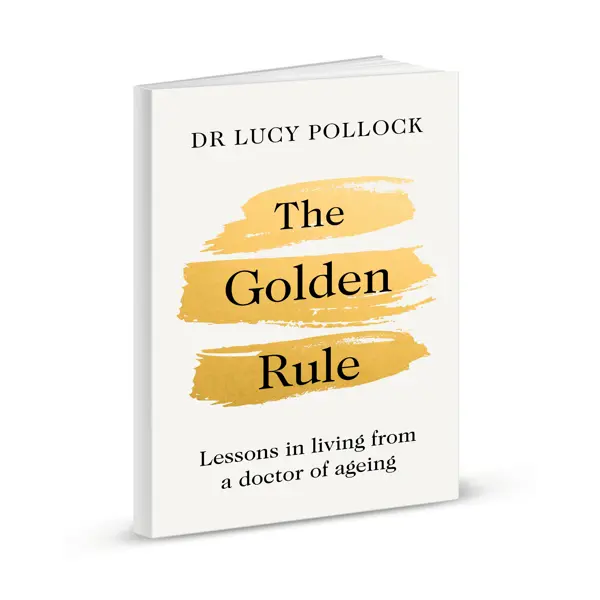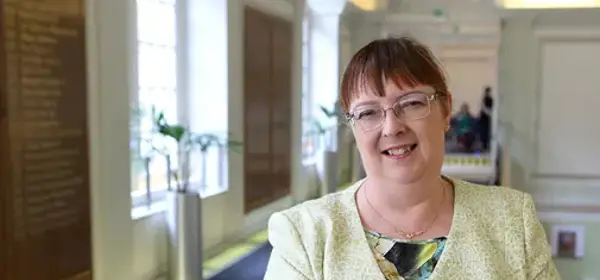
The old ways
Fewer medical interventions done ‘just because we can’. More time, kindness and listening. And do as you would be done by. Lucy Pollock, geriatrician and author, explains her philosophy when caring for her older patients to Seren Boyd
Geriatric medicine has long had a bit of an image problem.
A first-year medical student with an ambition to join the specialty is a rare find. And any such ambition would receive little encouragement as ageing and geriatrics barely feature in medical school curricula.
There is another issue: as consultant geriatrician Lucy Pollock is the first to point out, ‘no one wants to be seen by a geriatrician’. (A psychogeriatrician colleague insists he is even less popular.)
‘People pitch up in our clinic and they’re thinking: the GP said it was for an MOT or a specialist review. Nobody said anything about geriatrics!’ says Dr Pollock.
‘It definitely has been a Cinderella specialty – with people not recognising the very sound science underpinning it – and that has held it back. But it is an important specialty and it is important it comes to the foreground now.’
Dr Pollock wants to champion geriatric medicine and the typically ‘modest types’ who make up its ranks – because she feels its priorities and concerns are often misunderstood, even by colleagues in other specialties.
And even more importantly she wants to speak up for geriatrics’ clientele – the millions of individuals anonymised and bagged together as ‘older people’.
COVID’s terrible lesson
If anyone needed a reminder about why healthcare needs to adapt as patients age, the experience of care homes during COVID provided a brutal lesson.
A single appalling day at a residential home in Somerset in February 2021, retold in Dr Pollock’s new book The Golden Rule, was symptomatic of much that was wrong with public health policy during the pandemic.
When Dr Pollock was called in, none of the regular team was on duty: most were ill or isolating at home. Dr Pollock and cover staff had no access to medical records for some residents, no access to TEPs (treatment escalation plans) for any of them. And many residents were deteriorating fast.
The cover team was helpless to know what was normal for patients, what their wishes were, even whether they had family. ‘No one knows anyone,’ she wrote in painfully sparse prose.
One of the main problems on the day was IT-related, but this was compounded by many other issues, some whose impact and import only emerged later. Inadequate infection control, lack of PPE, the unintended consequences of isolating the dying and lonely.
We are at a tipping point where medicine can become depersonalised very quickly
Dr Pollock
Dr Pollock is still angry that geriatricians were not involved in pandemic-planning meetings of SAGE (the Scientific Advisory Group for Emergencies). Infection control could have been transformed, she insists, by the simple recognition that older people with COVID tended to present with delirium and falls, rather than coughing and fever, for example.
‘I haven’t stopped thinking about that day and the only way to lay it to rest is to say there are so many things that we can do that would have made that situation better: this does not need to happen again.’
Among her many ‘Lessons from a pandemic’ is the plea that ‘all NHS staff have the skills they need to care for the ageing population’. She’s not asking for everyone to become a geriatrician but some small shifts in mindset – some ‘age-attuned’ thinking – might help.
Names not bed numbers
If ever a colleague refers to a patient by their room or bed number instead of their name, Dr Pollock gives them short shrift.
‘If one of my team says, “Can I talk to you about C6?” I say no,’ she says, uncharacteristically stern.
‘I understand that they’re busy and they can’t always remember the patient’s name. But you can say “the woman in C6 whose name I can’t remember”. That’s fine.
‘This is all about power and about being human. We are at a tipping point where medicine can become depersonalised very quickly now.’
The Golden Rule, published by Penguin Michael Joseph, is rich with patients’ personalities and pen portraits, with affectionate attention to detail and first names. The person who ‘needs their face and hands wiping, their cardigan putting back on the right way round’ is also in the nearby photo, the ‘young woman in a sturdy panelled swimming costume, tossing her curls’.
Dr Pollock admits she’s guilty of stereotyping, too. When elderly Bill tells her he was in manufacturing, she assumes ‘bread, bricks or shoes’: he made particle accelerators.
But this is not just a plea that patients are treated as individuals; it’s also an insistence that in medicine one size does not fit all.
‘Frail older people are complicated,’ says Dr Pollock, ‘and things tend not to go well if you just apply algorithmic medicine or you try to give them medications that were trialled in younger patients with only one condition.’
Prescribing is a case in point: she increasingly sides with those who have ‘a waning enthusiasm for a medicine-based approach’ in the care of older people. The book cites a large study questioning the focus on ‘aggressive blood pressure reduction’ in people with frailty over 75 and anyone over the age of 85, for example.
Likewise, in caring for older people with depression, she first checks if their existing medication can lower mood and is much more likely to consider social prescribing, social connection, than anti-depressants
by default.
She cites a UK Government-commissioned review into overprescribing in 2021 which found that about one in five hospital admissions in the over-65s is caused by the adverse effects of medicines.
‘As medical students we are all taught about prescribing,’ says Dr Pollock, ‘but we are not simultaneously taught about deprescribing: the two should go hand in hand. The British National Formulary gives you the indications, dose, side effects, contraindications and cautions. And I wish that it had, for every drug, a little section at the bottom about how to stop this medicine.’
Listen to patients
The Golden Rule is not just for doctors: Dr Pollock would not presume to lecture other specialties anyway. But there is one point that modern medicine can sometimes ignore, she says: that as people age, their priorities change.
And this can be all the more true if they fear or fall prey to progressive conditions such as dementia, the leading underlying cause of death in England and Wales in 2022.
She lingers on the importance of listening to older patients’ priorities, knowing what matters to them – and not presuming that, just because a treatment is available or the guidance recommends a particular procedural pathway, a patient necessarily wants it. For lives beset by so much uncertainty, it’s a small courtesy.
Provisos such as the one NICE (National Institute for Health and Care Excellence) makes, that its guidance ‘does not override the responsibility of healthcare professionals to make decisions appropriate to the circumstances of the individual patient’, are often lost in the small print, she feels.
‘We have become so risk averse and so process driven,’ Dr Pollock insists. ‘A lot of what we are doing to patients adds absolutely no value.’
A lot of what we are doing to patients adds absolutely no value
Dr Pollock
She gives the example of a patient in the care of the ‘Hospital@Home’ service she helped establish in Somerset where patients can receive acute care, monitoring and treatment without leaving their house.
‘If you and the patient decide together that they’d rather stay at home, they then do not need to see two paramedics, a triage nurse, a junior doctor, consultant, a radiographer and porter and HCA, a cleaner and social workers, and they don’t spend weeks and weeks in a rehab setting.
‘Futility is very subjective,’ she admits. But something needs to change. She quotes an OECD report from 2016 which estimated that up to 20 per cent of healthcare activity globally is of no value to the patient. She thinks that’s an underestimate.
‘Let’s stop the circus. Let’s pause for a moment and think about what matters. What are your goals? What are your hopes and wishes?
‘This is absolutely not about denying people treatment. It’s about getting the right balance between making sure people are offered appropriate treatment and not assuming they want everything that’s on offer.’
Quality not quantity
In The Golden Rule we meet Wes who is very ill but wants to be at home with his wife and familiar things. Dr Pollock and her nurse colleague make him comfortable but cannot stay with him, and she ponders the risk of him dying before the next nurse arrives. The greater risk, she concludes, is that he will be admitted to hospital and die there. ‘We are seeing risk in the wrong place,’ she writes.
Inevitably, death and dying feature frequently in Dr Pollock’s work and in her book – and talk of treatment options necessarily turns to resuscitation and TEPs.
She is no advocate of assisted dying but she is intentional about avoiding unnecessary treatment, especially in the final stages of life. She worries modern medicine leaves many doctors and patients’ relatives feeling there’s ‘an absolute obligation to prolong life’, when GMC guidance explicitly states that this isn’t the case.
She thinks people might be spared some of their distress in choosing a DNR (‘do not resuscitate’ order) for a loved one if the prognosis for older patients undergoing CPR were more widely known.
Within living memory, she says, ‘really frail older people didn’t come to hospital: nobody would have dreamt of sending them in. Their family doctor, who knew them and their family, would arrange for them to have a peaceful death at home. Then we moved all dying into hospital.’
It’s about making sure people are offered appropriate treatment and not assuming they want everything that’s on offer
Dr Pollock
She recognises some patients do want to live as long as possible – because this is not about denying people treatment when it’s wanted – but for many the priority shifts ‘from quantity to quality of life’.
The key to getting things right is what Dr Pollock calls ‘front-loaded time’ – taking sufficient time early on to discuss patients’ goals and priorities. Current pressures raise many barriers to this – staffing levels chief among them – but courage and honesty are needed too.
‘Often people won’t say it, or the person with dementia can’t say it and there’s a fear or shame for their family in saying it. But when you start asking the questions about what this patient would actually want us to be doing, you often hear a completely different story. You have to pin your ears back and listen and actively ask those tender questions. I need to approach people with kindness and with an open mind, wanting to hear what’s important to them.
‘But I do spend a lot of my time stepping out of the way of death who’s galloping towards my patient. Allowing somebody to have an unassisted death if they want that is really important. I get my best thank you letters from families who contact me after someone has died because we’ve got it right for them.’
Society is ageing, and ageing is changing. What happens if trans patient Josie develops dementia and forgets her chosen gender? Dr Pollock asks. What kind of medico-ethical conundrums might a child with four mums (lesbian parents, an egg donor and a surrogate mother) present?
Medicine will need to wrestle and move with the changes. But it must not lose sight of the ‘golden rule’ of her title: ‘Do as you would be done by.’
This is about kindness, showing respect and recognising the small, human things that make for ‘profound connection’, ‘often a moment of physical contact – my patient’s hair had fallen across her face and I would smooth it with my thumb’.
When you start asking what this patient would actually want us to be doing, you often hear a completely different story
Dr Pollock
But there’s also a warning embedded in the golden rule. How we treat older people today and our attitudes to them will affect their ageing – because ageing is ‘a deeply social and psychological process’. And our attitudes to ageing and the aged will shape the care that we receive when we join the ranks of ‘older patients’.
The good news is that geriatric medicine is now oversubscribed; the bad news, there are not enough posts for all the trainees choosing the specialty today. Dr Pollock is still grateful to an early boss at the Royal London Hospital, when she was a junior, who hoped she ‘wouldn’t be offended’ if he suggested she might consider geriatrics.
Her final message which resonates long beyond the last page is: ‘We are the ageing population.’ And by implication: we’re next.
- Until September 2024, resident doctors were referred to as ‘junior doctors’ by the BMA. Articles written prior to this date reflect the terminology then in use




